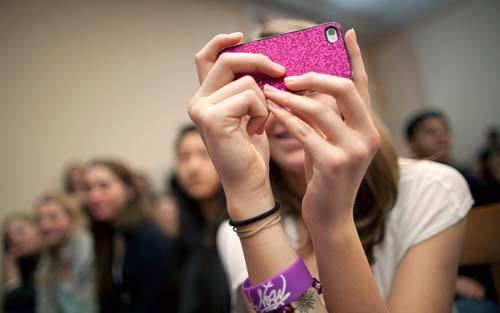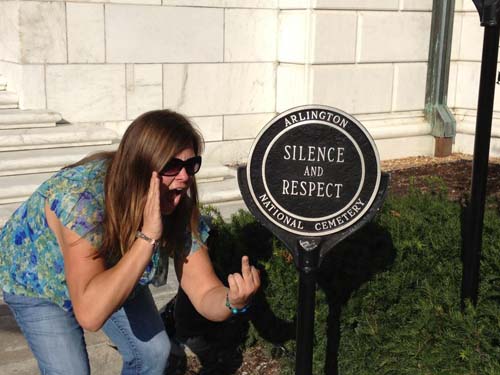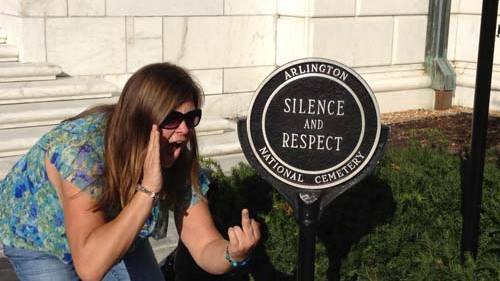Too much information
Source: aeonmagazine.com
Our instincts for privacy evolved in tribal societies where walls didn’t exist. No wonder we are hopeless oversharers
In October 2012 a woman from Massachusetts called Lindsey Stone went on a work trip to Washington DC, and paid a visit to Arlington National Cemetery, where American war heroes are buried. Crouching next to a sign that said ‘Silence and Respect’, she raised a middle finger and pretended to shout while a colleague took her photo. It was the kind of puerile clowning that most of us (well me, anyway) have indulged in at some point, and once upon a time, the resulting image would have been noticed only by the few friends or family to whom the owner of the camera showed it. However, this being the era of sharing, Stone posted the photo to her Facebook profile.

Within weeks, a ‘Fire Lindsey Stone’ page had materialised, populated by commentators frothing with outrage at a desecration of hallowed ground. Anger rained down on Stone’s employer, a non-profit that helps adults with special needs. Her employers decided, reluctantly, that Stone and her colleague would have to leave.
More recently, Edward Snowden’s revelations about the panoptic scope of government surveillance have raised the hoary spectre of ‘Big Brother’. But what Prism’s fancy PowerPoint decks and self-aggrandising logo suggest to me is not so much an implacable, omniscient overseer as a bunch of suits in shabby cubicles trying to persuade each other they’re still relevant. After all, there’s little need for state surveillance when we’re doing such a good job of spying on ourselves. Big Brother isn’t watching us; he’s taking selfies and posting them on Instagram like everyone else. And he probably hasn’t given a second thought to what might happen to that picture of him posing with a joint.
Walls are a relatively recent innovation. Members of pre-modern societies happily coexisted while carrying out almost all of their lives in public view
Stone’s story is hardly unique. Earlier this year, an Aeroflot air hostess was fired from her job after a picture she had taken of herself giving the finger to a cabin full of passengers circulated on Twitter. She had originally posted it to her profile on a Russian social networking site without, presumably, envisaging it becoming a global news story. Every day, embarrassments are endured, jobs lost and individuals endangered because of unforeseen consequences triggered by a tweet or a status update. Despite the many anxious articles about the latest change to Facebook’s privacy settings, we just don’t seem to be able to get our heads around the idea that when we post our private life, we publish it.
At the beginning of this year, Facebook launched the drably named ‘Graph Search’, a search engine that allows you to crawl through the data in everyone else’s profiles. Days after it went live, a tech-savvy Londoner called Tom Scott started a blog in which he posted details of searches that he had performed using the new service. By putting together imaginative combinations of ‘likes’ and profile settings he managed to turn up ‘Married people who like prostitutes’, ‘Single women nearby who like to get drunk’, and ‘Islamic men who are interested in other men and live in Tehran’ (where homosexuality is illegal).
Scott was careful to erase names from the screenshots he posted online: he didn’t want to land anyone in trouble with employers, or predatory sociopaths, or agents of repressive regimes, or all three at once. But his findings served as a reminder that many Facebook users are standing in their bedroom naked without realising there’s a crowd outside the window. Facebook says that as long as users are given the full range of privacy options, they can be relied on to figure them out. Privacy campaigners want Facebook and others to be clearer and more upfront with users about who can view their personal data. Both agree that users deserve to be given control over their choices.
But what if the problem isn’t Facebook’s privacy settings, but our own?
A few years ago George Loewenstein, professor of behavioural economics at Carnegie Mellon University in Pittsburgh, set out to investigate how people think about the consequences of their privacy choices on the internet. He soon concluded that they don’t.
In one study, Loewenstein and his collaborators asked two groups of students to fill out an online survey about their lives. Everyone received the same questions, ranging from the innocuous to the embarrassing or potentially incriminating. One group was presented with an official-looking website that bore the imprimatur of their university, and were assured that their answers would remain anonymous. The other group filled out the questions on a garishly coloured website on which the question ‘How BAD Are U???’ was accompanied by a grinning devil. It featured no assurance of anonymity.
Bizarrely, the ‘How BAD Are U???’ website was much more likely to elicit revealing confessions, like whether a student had copied someone else’s homework or tried cocaine. The first set of respondents reacted cautiously to the institutional feel of the first website and its obscurely concerning assurances about anonymity. The second group fell under the sway of the perennial youthful imperative to be cool, and opened up, in a way that could have got them into serious trouble in the real world. The students were using their instincts about privacy, and their instincts proved to be deeply wayward. ‘Thinking about online privacy doesn’t come naturally to us,’ Loewenstein told me when I spoke to him on the phone. ‘Nothing in our evolution or culture has equipped us to deal with it.’
[...]
Read the full article at: aeonmagazine.com






















